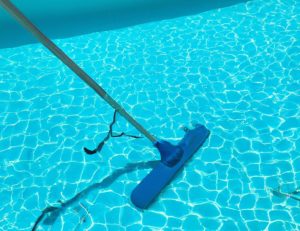How Often Should You Clean Your Swimming Pool? Expert Advice and Tips

Maintaining a clean and well-maintained swimming pool is essential for the enjoyment and safety of swimmers. One common question that pool owners often ask is, “How often should you clean a swimming pool?” Cleaning frequency depends on various factors, including pool usage, environmental conditions, and the presence of debris. In this article, we’ll provide expert guidance from Community Home Services, a trusted name in pool maintenance, to help you determine the ideal cleaning schedule for your swimming pool.
A clean pool is not only visually appealing but also contributes to optimal water quality and prolongs the lifespan of pool equipment. Let’s explore some key areas that require regular cleaning attention:
Dirty/Green Water
If your pool water appears cloudy or green, it’s a sign that it needs immediate attention. Regular testing and balancing of water chemistry, including maintaining appropriate sanitizer and pH levels, can help prevent this issue.
Marks on Waterline
Over time, mineral deposits, oils, and other contaminants can accumulate on the waterline, resulting in unsightly marks. Regularly cleaning the waterline helps maintain the pool’s aesthetic appeal.
Debris on Pool Floor
Leaves, twigs, and other debris can settle on the pool floor, making the water uninviting. Regularly skimming the surface and using a pool vacuum to remove debris from the pool floor are vital maintenance tasks.
Caring for Your Pool Filter
The pool filter is responsible for trapping dirt, debris, and impurities. Cleaning or backwashing the filter regularly is necessary to ensure proper filtration and water circulation.
Maintain Chemical Balance
Regularly test and adjust the chemical balance of your pool water. This includes monitoring chlorine, pH, alkalinity, and other essential levels to keep the water clean and safe for swimming.
Check Your Pump and Filter
Inspect the pool pump and filter regularly to ensure they are functioning properly. Clean or replace filter cartridges as needed to maintain optimal performance.
Invest in a Pool Cover
Using a pool cover when the pool is not in use helps minimize debris accumulation, reduces evaporation, and conserves energy. It also protects the pool from environmental factors and helps maintain water cleanliness.
By following these key cleaning practices, you can ensure a clean and inviting swimming pool for your family and friends to enjoy. However, determining the precise cleaning frequency depends on various factors specific to your pool. Consider seeking professional guidance from Community Home Services to establish a tailored cleaning schedule that suits your pool’s needs.
Recommended Cleaning Practices for a Pristine Swimming Pool
To maintain a pristine swimming pool, it’s important to establish a regular cleaning routine. Here are some recommended cleaning practices and frequencies to keep your pool in excellent condition:
- Skimming and Surface Cleaning
Skim the pool surface daily or as needed to remove leaves, insects, and other debris. Surface cleaning prevents the debris from sinking to the bottom and keeps the pool looking clean and inviting.
- Vacuuming and Brushing
Vacuum the pool floor and walls on a weekly basis to remove dirt, sediment, and algae. Brushing the walls and tile line helps prevent the buildup of stubborn stains and mineral deposits.
- Cleaning the Waterline
Regularly clean the waterline to remove dirt, oils, and residue that accumulate over time. Use a suitable pool cleaner or a mild detergent and a soft brush to gently scrub the waterline and keep it free from unsightly marks.
- Emptying Skimmer Baskets and Pump Strainer
Check and empty the skimmer baskets and pump strainer regularly to ensure proper water circulation and prevent clogs. Clean baskets help maintain the efficiency of the filtration system.
- Backwashing or Cleaning the Filter
Depending on the type of pool filter you have (sand, cartridge, or DE), backwash or clean the filter as recommended by the manufacturer. This process removes trapped debris and ensures the filter operates efficiently.
- Testing and Balancing Water Chemistry
Regularly test the water chemistry of your pool using a reliable test kit. Maintain proper pH, chlorine, alkalinity, and calcium hardness levels to prevent the growth of algae, bacteria, and other water quality issues. Aim to test the water at least once a week, and more frequently during periods of heavy pool usage or extreme weather conditions.
- Inspecting and Maintaining Pool Equipment
Periodically inspect your pool equipment, including the pump, filter, and pool cleaner, to ensure they are functioning properly. Lubricate o-rings, check for leaks, and address any issues promptly to avoid further damage.
- Professional Pool Service
Consider scheduling regular professional pool service to ensure comprehensive maintenance and expert care. Professionals have the knowledge and expertise to perform in-depth inspections, diagnose potential problems, and provide specialized treatments when needed.
Remember, these recommendations serve as general guidelines. Factors such as pool size, usage, weather conditions, and personal preferences may influence the specific cleaning frequencies for your pool. Consulting with pool maintenance experts, like the team at Community Home Services, can help you establish a customized cleaning schedule tailored to your pool’s unique requirements.
Contact Us Today at Community Home Services
Ready to keep your swimming pool in pristine condition? Contact Community Home Services today at (972) 722-1200 or visit our website to schedule an appointment with our expert pool maintenance team. Let us provide you with professional and reliable pool cleaning services, ensuring your pool remains a sparkling oasis for endless enjoyment.
